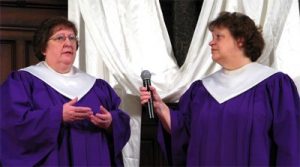Giving Thanks for the Stories
“We give thanks, O God of sacred stories, for the witness of holy scripture. Through it, you nurture our imaginations, touch our feelings, increase our awareness, and challenge our assumptions. Bless, we pray, our hearing of your word this day. Speak to each of us; speak to all of us; and grant that by the power of your Spirit, we may be hearers and doers of your word. Amen”
Prayer by Ann B. Day, contributed by Carol Miller

Improving Your Storytelling
Tell it Like a Joke
by Dina Ferguson
Tom Boomershine’s tip from telling a joke has always stuck with me. I remember it this way: “We’ve all heard someone mess up a joke. They start, and then they can’t remember who’s in it (is it a fireman, a doctor and a priest?); or they get lost and forget how to get to the punchline; or they mess up the punchline. But none of us has ever heard anyone mess up a joke by saying, ‘Oh snap! what’s the next word?’ This story freed me up (at least somewhat!) from being stuck on the words. Knowing how the story starts and ends is most important. But there is always another word that can help me get from here to there. Dina Fergusen dddina@gmail.com<mailto:dddina@gmail.com>
This tip for improving your storytelling is reprinted with permission from “Scholarly Musings” published online by the Network of Biblical Storytellers. This month’s tip comes to you from Rev. Dina Ferguson, D.Min.—biblical storyteller, Episcopal priest, Network of Biblical Storytellers leader.
Telling the Stories in Worship
by Carol Miller

Carol Miller (right) telling scripture with her sister, Myrna
I grew up in a “Grace” filled home where we heard “stories of Jesus” before we could even read. We sang “Tell me the Stories of Jesus” while still young enough to sit on our parent’s knee. So, telling scripture wasn’t new to us.
When our congregation was introduced to Biblical Storytelling, it was like a reawakening to the comforting, challenging, hopeful, and personal Word of God. The fact that the storytellers are primarily laity helps me to know that these words are for all to tell.
I think what moves me the most (besides the Word of God which is first and foremost) is the fact that I know the tellers and I am aware of some of their own inner struggles which always seem to be reflected in either the scriptures they choose to tell or the way they tell the scriptures assigned to them.
It may be a woman who was never able to bear children that tells the story of the birth of Jesus and how Mary “wrapped him in swaddling clothes and laid him in a manager,” or someone who has “walked through the shadow of death” telling the 23rd Psalm, or a man in the legal field telling the stories of the many “arguments” found in the Bible.
There are so many examples of people I know who have experienced life’s hardships and tragedies that have found hope and comfort in the process of learning about and “telling” the stories of the Bible.
I found that you can’t just “memorize” scripture and tell it, even if in the beginning you think that’s all there is to it. You find yourself drawn into “the story behind the story.” What was the reason for the story, what was going on in the world at that time, what were they feeling as the story unfolded? I think for most of the tellers there is that “Ah, ha” moment when you realize the true meaning of a passage, or how relevant to our times the passage has become.
I truly believe that since we began “Grace by Heart” I have come closer to a deeper understanding of scripture and look forward every Sunday to experiencing God’s word from God’s people told in many wonderful, awe-inspiring ways and I thank God!
Carol Miller is a member of Grace United Methodist Church in Dayton, Ohio. She was a founding member of “Grace by Heart” in 2007. All this scriptures are told by heart in worship every Sunday at Grace.

